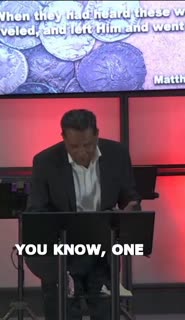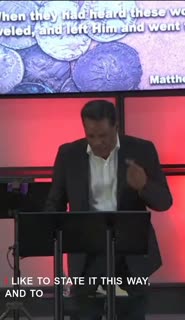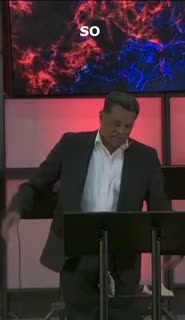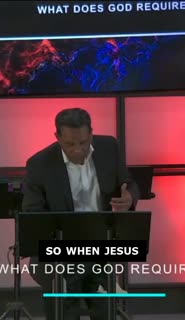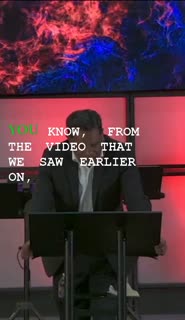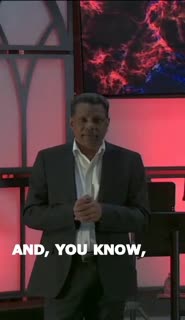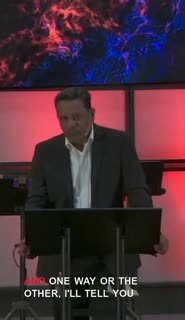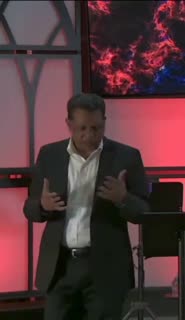Faithful Citizenship: Balancing Spirituality and Civic Duty
Devotional
Sermon Summary
Bible Study Guide
Sermon Clips
1) "You know, one thing that we must be careful not to do, and that is to equate human government with the government of God. And that's... What a lot of people are doing right now with these elections. We're thinking that somehow God is in the process. And He might be in the process. But you'll find later on, I'll tell you, I'll show you how maybe He's not in the process. Which a lot of people are doing in this cycle now. Human government, at best, is deeply flawed and is part of a broken, fallen humanity." [01:01:23] (31 seconds)
2) "I like to state it this way, and to express it this way, there is the kingdom of God, and there is the kingdom of Satan. The kingdom of God, or the kingdom of heaven, is what Jesus preached about, and what He taught us to live in. And that's what we are to teach as well. He proclaimed that the kingdom of heaven, or the kingdom of God, had drawn near because the King had come. But He also said that we should pray for the coming of the kingdom of God. Amen? So God's kingdom is not here in its entirety, but it is to come. And we are to pray that God's kingdom will come. Amen?" [01:02:14] (38 seconds)
3) "So when we think about it today, we realize that we may have been founded on biblical principles, but we have not been a totally Christian nation. Do we have a large percentage of Christian people? Yes, we do. Do we have many, many Christian churches around? Yes, and we thank God for that. Can we stand here today and proclaim the name of Jesus in freedom? Yes, we can do that, and I love that. That's one of the things I love about this country and the fact that we can stand and we can proclaim the name of Jesus without fear. Amen?" [01:05:25] (30 seconds)
4) "So when Jesus said, give to God what is God's, we who proclaim his name should understand what he wants, what he requires of us. So when you go to the voting booth to render to Caesar, make sure that you are not confused. Confused. Make sure that you understand that you're rendering to Caesar, but at the end of the day, I bend my knees to God. He is the one who I bow my heart to. Your vote does not determine your salvation. Don't let anybody tell you anything other than that." [01:28:04] (32 seconds)
6) "You know, from the video that we saw earlier on, it says this. Pray earnestly. Seek God passionately. Listen carefully and vote how the Lord leads you. God is suffering. He always has been. He's faithful and always will be. Nothing, absolutely nothing happens outside of his providence. This is where we find peace in this moment. And on Wednesday morning, if you find out that your party of choice has not prevailed, don't lose hope because our hope is in God." [01:48:31] (33 seconds)
7) "And, you know, the same thing is going to happen for the next four years, right? We're going to, we're going to, we live in the greatest country in the world. I want you to know that. And, you know, I've come from a country where you are not sure if the tap is going to have water all the time. You're not sure if the lights are going to go on. As a matter of fact, in the middle of the day, middle of the night, the light goes off. You don't know. That's what we lived under, right?" [01:49:57] (21 seconds)
8) "And one way or the other, I'll tell you this right now, one way, whichever direction the country goes in tomorrow, this week, whichever direction it goes, you're going to still be around and you will survive. You will survive. Don't ever let anybody feel that you will not survive. Because, they're not in power. That's a big lie for the pit of hell. Understand us. Amen. God is your source. He's your provider." [01:52:35] (21 seconds)
9) "I hope that through this sermon today, it kind of brings things a little bit more in perspective on who we are as Christians. Don't get caught into the fighting. Don't get caught into the hate. Don't get caught in the division. Don't get caught into all the political rhetoric that's going on. Always remember to let God have his will in your life. Amen." [01:55:35] (20 seconds)
Ask a question about this sermon
2) "I like to state it this way, and to express it this way, there is the kingdom of God, and there is the kingdom of Satan. The kingdom of God, or the kingdom of heaven, is what Jesus preached about, and what He taught us to live in. And that's what we are to teach as well. He proclaimed that the kingdom of heaven, or the kingdom of God, had drawn near because the King had come. But He also said that we should pray for the coming of the kingdom of God. Amen? So God's kingdom is not here in its entirety, but it is to come. And we are to pray that God's kingdom will come. Amen?" [01:02:14] (38 seconds)
3) "So when we think about it today, we realize that we may have been founded on biblical principles, but we have not been a totally Christian nation. Do we have a large percentage of Christian people? Yes, we do. Do we have many, many Christian churches around? Yes, and we thank God for that. Can we stand here today and proclaim the name of Jesus in freedom? Yes, we can do that, and I love that. That's one of the things I love about this country and the fact that we can stand and we can proclaim the name of Jesus without fear. Amen?" [01:05:25] (30 seconds)
4) "So when Jesus said, give to God what is God's, we who proclaim his name should understand what he wants, what he requires of us. So when you go to the voting booth to render to Caesar, make sure that you are not confused. Confused. Make sure that you understand that you're rendering to Caesar, but at the end of the day, I bend my knees to God. He is the one who I bow my heart to. Your vote does not determine your salvation. Don't let anybody tell you anything other than that." [01:28:04] (32 seconds)
6) "You know, from the video that we saw earlier on, it says this. Pray earnestly. Seek God passionately. Listen carefully and vote how the Lord leads you. God is suffering. He always has been. He's faithful and always will be. Nothing, absolutely nothing happens outside of his providence. This is where we find peace in this moment. And on Wednesday morning, if you find out that your party of choice has not prevailed, don't lose hope because our hope is in God." [01:48:31] (33 seconds)
7) "And, you know, the same thing is going to happen for the next four years, right? We're going to, we're going to, we live in the greatest country in the world. I want you to know that. And, you know, I've come from a country where you are not sure if the tap is going to have water all the time. You're not sure if the lights are going to go on. As a matter of fact, in the middle of the day, middle of the night, the light goes off. You don't know. That's what we lived under, right?" [01:49:57] (21 seconds)
8) "And one way or the other, I'll tell you this right now, one way, whichever direction the country goes in tomorrow, this week, whichever direction it goes, you're going to still be around and you will survive. You will survive. Don't ever let anybody feel that you will not survive. Because, they're not in power. That's a big lie for the pit of hell. Understand us. Amen. God is your source. He's your provider." [01:52:35] (21 seconds)
9) "I hope that through this sermon today, it kind of brings things a little bit more in perspective on who we are as Christians. Don't get caught into the fighting. Don't get caught into the hate. Don't get caught in the division. Don't get caught into all the political rhetoric that's going on. Always remember to let God have his will in your life. Amen." [01:55:35] (20 seconds)
